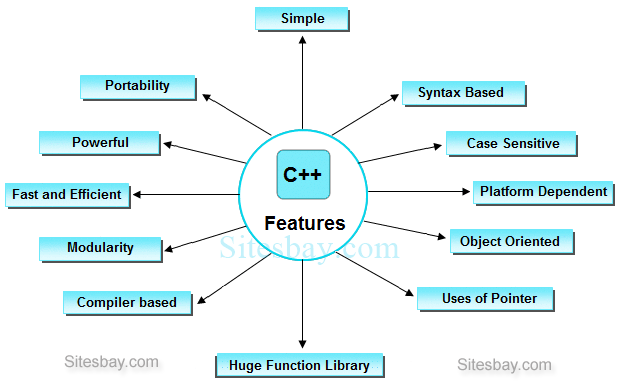Features of C++

C++ is a powerful and versatile programming language that offers a wide range of features, combining procedural, object-oriented, and generic programming paradigms. Here are some key features of C++:
-
Object-Oriented Programming (OOP):
- C++ supports object-oriented programming principles such as encapsulation, inheritance, and polymorphism.
- Classes and objects: C++ allows the creation of classes to encapsulate data and methods, and objects to represent instances of those classes.
- Inheritance: C++ supports both single and multiple inheritance, allowing classes to inherit properties and behaviors from other classes.
- Polymorphism: C++ supports polymorphism through function overloading, virtual functions, and abstract classes.
-
Generic Programming:
- Templates: C++ templates enable generic programming by allowing functions and classes to operate with generic types. This allows for the creation of reusable algorithms and data structures that work with different data types.
-
Standard Library (STL):
- The Standard Template Library (STL) provides a collection of classes and functions for tasks such as data structures, algorithms, input/output operations, and other utilities.
- Containers: STL provides container classes such as vectors, lists, queues, stacks, maps, and sets.
- Algorithms: STL includes a wide range of algorithms for tasks such as sorting, searching, and manipulating containers.
- Iterators: Iterators provide a way to traverse and manipulate elements in containers in a generic and efficient manner.
-
Memory Management:
- C++ supports both automatic and dynamic memory management.
- Automatic memory management is achieved through stack allocation for local variables and automatic object destruction when they go out of scope.
- Dynamic memory management is facilitated by operators such as
new and delete for dynamic allocation and deallocation of memory.
-
Performance:
- C++ is known for its performance and efficiency. It provides low-level access to hardware and system resources, allowing for fine-grained control over memory and system resources.
- C++ compilers generate highly optimized machine code, making it suitable for performance-critical applications such as systems programming, game development, and scientific computing.
-
Platform Independence:
- C++ code can be compiled to run on various platforms, including Windows, macOS, Linux, and others, making it suitable for developing cross-platform applications.
-
Concurrency:
- C++11 introduced support for multithreading and concurrency with features such as threads, mutexes, condition variables, and atomic operations.
- C++ also provides higher-level concurrency abstractions through libraries such as the C++ Standard Library and third-party libraries like Boost.
-
Compatibility with C:
- C++ is largely compatible with C, allowing for seamless integration of C code into C++ programs.
- C++ compilers can compile and execute C code, and C++ code can call functions written in C.
These are just some of the key features of C++. The language continues to evolve with each new standard, introducing additional features, improvements, and enhancements to make it more powerful, expressive, and efficient.
Thank you,
